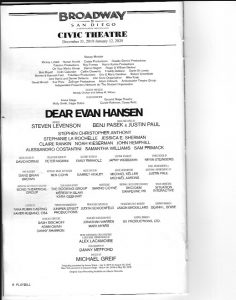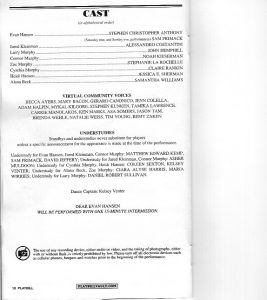Evan Hansen Gropes For the Truth
In the musical Dear Evan Hansen, a hard-working single mom soothes her troubled son that the only kids who really enjoy high school are cheer-leaders and jocks.
I always felt something like that myself, at least after the fact. But these days, with the environment of youth so vastly expanded by world-wide electronics, it’s hard to see who’s having fun. There’s room for everything but growing up.
Maybe if you’re not troubled, something’s wrong.
Certainly, young Evan qualifies. He’s so shy, he’s almost invisible. He mumbles so fast, he’s practically incomprehensible. Mom’s never around, Dad’s long gone and he’s left to wonder, “Anybody Have a Map?”
Then one day, by accident, he becomes a star.

Stephen Christopher Anthony and Jessica E. Sherman in touring Dear Evan Hansen at the Civic Theatre. Matthew Murphy Photo
A classmate named Connor is even worse off than Evan, even though he has loving and prosperous parent and a younger sister who is the stuff of Evan’s dreams. Evan doesn’t really know this Conner except as a berserker bully whose anguish climaxes in suicide. Then, in the dead boy’s pocket an unfinished note is found, addressed “Dear Evan Hansen,” so the grieving parents reach out.
Finally, a map. Even if it only explores unreality, Evan’s fantasies blossom. To the obviously needy family, he supplies a hidden life for their son as his frequent correspondent and close companion on outings for just the two of them. Not gay stuff, he hastens to stipulate, just BFF. To Connor’s bewildered younger sister, he pours out adoration only slightly adjusted for a sibling. At school, he puts on a necktie and gives an earnest eulogy…
…Which goes viral.
A couple of fellow nerds move in with their own agendas to fan the flames of fame. An online fund-raising campaign is begun to raise money for restoring the boys’ “favorite apple orchard” as a memorial to Connor. Since his mom’s always off at work or classes, Evan starts to accept the frequent invitations to hang out with Conner’s family. The dad wants to show Evan how to break in the baseball glove Conner never cared about, in a song of naked paternal need. And the sister melts.
It can’t last, of course. And that’s the Second Act: Who gets hurt, who may even have been helped and a whiff of what’s next.
Teen suicide is far from a joking matter. Exploitation is distasteful and lying never really wins. It’s possible to see this as a bunch of victims manipulated by Evan, an appealing jerk. But this is musical theater and some sort of positive resolution is expected. Thus the large servings of hope and healing.
Steven Levenson’s book is frail but persistent in recognizing sad realities. The songs, by Benj Pasek and Justin Paul, are a serviceable mix of storytelling and analysis which sometimes – as with the solemnly upbeat “You Will Be Found” and the poignant baseball-glove instructions – can be quite moving.
The authors use just eight actors to tell the story so director Michael Greif must be resourceful. Levenson uses the straightforward story-telling technique, increasingly universal these days, and Greif has molded the staging as a fluid vehicle to match. Unfortunately, he has allowed the pace to accelerate beyond comprehension so often that the story goes vague and loses impact. Plus, some the actors simply haven’t the diction meet the demands and the uneven sound enhancement. And fast talk is indeed a useful indicator of stress. But communication is so much more important.
As Evan, Stephen Christopher Anthony is an appealing kid but lacking both in the technique to make all that galloping dialogue understood and the spark of desperation that could illuminate the character’s arc. Noah Kieserman overacts as Connor but there’s no doubt about what he’s saying and who he is. Likewise, Alessandro Costantini and Samantha Williams as Evan’s overheated pals, especially Williams with her clarion diction, hustle the story along. Stephanie La Rochelle as the younger sister barely registers.
Jessica E. Sherman as Evan’s mom offers a moving self-analysis across the generation gap with “So Big/So Small.” Claire Rankin and John Hemphill are sympathetic as the bereft parents.
The show’s design is sturdy and wise, giving Greif and choreographer Danny Mefford a supportive framework for stage pictures. Endless streaming video by Peter Nigrini and moving plexiglass panels are the basis of David Korins’ scenery, setting up a final scene of apple saplings against clear blue sky to great effect. Costumer Emily Rebholz uses the expected hoodies, tee shirts and leggings in such a way that sudden neckties (only two) are a splash of reality. Japhy Weideman’s go-to lighting effect is stabbing spotlights converging, a impactful approach.
While the music isn’t special, it is effective, especially given the facile arrangements by Alex Lacamoire, who makes a trio of traditional strings on one side and a standard pop band on the other blend seamlessly.
From this show, I hope people go away with a reinforced belief that truth always works best, even if it takes time to register. And the surest path for truth is communication, just paying attention and responding with sincerity. No matter how trite and uncool that may sound, it’s for sure what works best. As Evan Hansen discovers.
(Continues for Broadway San Diego in the Civic Theatre at 7 p.m. Tuesday and Wednesday; 7:30 p.m. Thursday; 8 p.m. Friday and Saturday; 2 p.m. Saturday; 1 p.m. Sunday; and 6:30 p.m. Sunday through Jan, 12, 2020.)

Welton Jones has been following entertainment and the arts around for years, writing about them. Thirty-five of those years were spent at the UNION-TRIBUNE, the last decade was with SANDIEGO.COM.






